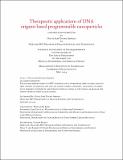Therapeutic applications of DNA origami-based programmable nanoparticles
Author(s)
Arnold, Olivia Jane Young
DownloadThesis PDF (14.80Mb)
Advisor
Shih, William M.
Terms of use
Metadata
Show full item recordAbstract
DNA origami utilizes the complementary Watson and Crick base pairing of DNA to self-assemble highly programmable nanoparticles. These nanoparticles have distinct advantages over other nanoparticle delivery platforms, including polymeric and lipid nanoparticles, in that they offer precise nanoscale resolution control over the attachment of therapeutic cargo, while other nanoparticle platforms only offer control over average ligand density. In this thesis, we demonstrate the therapeutic utility of DNA origami for cancer and infectious diseases. First, we demonstrate that modulating the nanoscale arrangement
of an adjuvant enhances the efficacy of cancer vaccines. Second, we demonstrate that this DNA origami nanoparticle can be used as a modular delivery vehicle for infectious disease associated antigens, enabling rapid response during pandemic situations. Third, we demonstrate the conjugation of CD40 ligand, an immune-activating molecule, onto the DNA origami nanoparticle, and describe initial investigations into the diverse spatial arrangements of CD40L and preliminary effects on the immune response. Collectively, these studies illustrate the potential of DNA origami as a therapeutic for various disease areas, as well as its potential as a tool for investigating biological
receptor-ligand interactions.
Date issued
2024-05Department
Harvard-MIT Program in Health Sciences and TechnologyPublisher
Massachusetts Institute of Technology